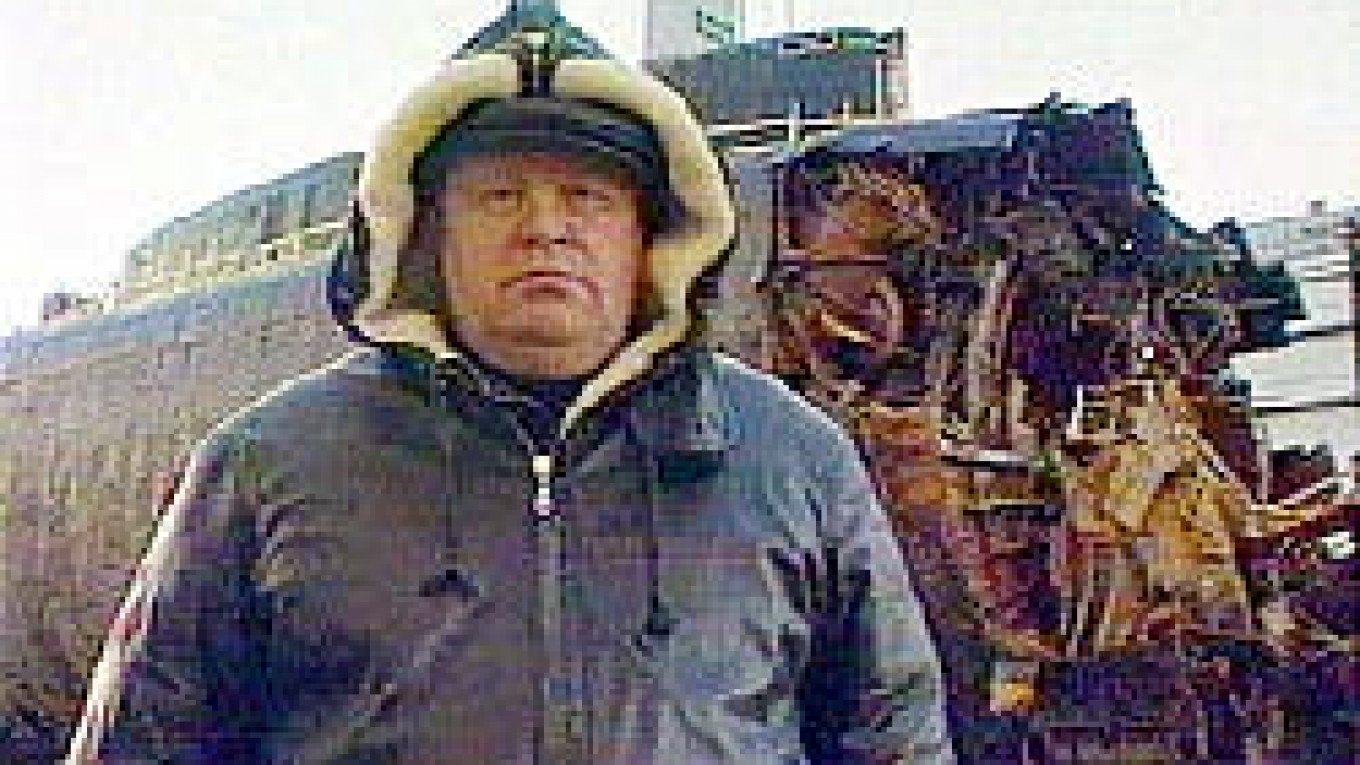"What happened inside these compartments was hell," said Prosecutor General Vladimir Ustinov as he presented a seven-minute videotape of the inside of the Kursk, now in a dry dock at the northern Roslyakovo port.
"The explosion ... wiped out everything here," Ustinov said in the film, shown on Russian television channels. The film went on to show the place where the Kursk's periscope once stood and which now resembles a surreal twisted column of metal.
"Everything is littered with equipment that was destroyed in the explosion," Ustinov said. "The strong alloys from which these compartments were built were simply ripped apart."
The Kursk's commanders and most of its crew died in the front compartments as two blasts 135 seconds apart sent the mighty submarine to the sea bottom, Ustinov said. A fire that spread rapidly after the explosions raised temperature inside the Kursk to 8,000 degrees Celsius, he said at a separate news conference in the northern port of Murmansk.
Ustinov said 19 bodies had been found over the past three days, and 17 had been removed. Seven of them have already been identified, he said.
The seven bodies were sent home by plane late Saturday and overnight to towns around Russia, Itar-Tass and ORT television reported. The navy did not release the names of the sailors or say where they were from.
Forensics experts continued working Sunday on identifying other bodies, while investigators continued painstaking examination of the submarine. Because of precarious conditions and poor air quality inside the Kursk, the crews worked in shifts and entered the submarine for just 20 minutes at a time.
Most of the Kursk's 118 sailors were killed by the powerful explosions that sank the submarine during naval exercises in August 2000, but at least 23 survived the disaster for hours in the stern compartments, according to letters found by divers who recovered 12 bodies from the sunken vessel a year ago.
"We are finding the bodies of the dead, and the main cause of death is suffocation," Ustinov said.
Ustinov, who leads the team of investigators, said experts believe the submarine was completely flooded within six to seven, "maximum eight hours."
The sailors who did not die in the explosions began feeling the effects of carbon monoxide poisoning within 90 minutes, judging by their notes. The first note by one sailor "is written in a steady, beautiful hand, and in a second note written an hour and a half later you can see it's difficult for him to write. This confirms that water and carbon monoxide began filling the ninth [stern] compartment," said Ustinov. "Those who think there was a possibility to save our sailors should know that there was no such possibility."
Despite the force of the explosions, the reactor compartment withstood the blasts and was only flooded by water coming from ventilation and other openings, he said.
Admiral Vladimir Kuroyedov, the navy commander, said the operation to fully disarm the submarine of its 22 Granit cruise missiles will begin next week. "At the moment, intensive preparations for unloading the missiles are under way," he said.
The bulk of the Kursk was raised from the Barents Sea floor on Oct. 8 in a $65 million salvage operation performed by the Dutch consortium Mammoet-Smit International. The mangled forward compartment, where the Kursk's torpedoes were located, was left on the bottom of the sea out of concern that it could break off and destabilize the lifting operation. The Giant-4 barge that towed the Kursk to shore as part of the international salvage operation left Roslyakovo on Sunday for Norway. The barge was accompanied by another vessel from Smit International, ORT said.
The cause of the disaster remains unknown, though Russian officials have focused on a torpedo that possibly misfired and exploded inside or near the Kursk during the exercise. Other versions include a collision with a World War II mine or another vessel, and there even has been speculation that the Kursk was hit by a missile fired by the Peter the Great cruiser. Kuroyedov said Saturday the latter version was "absurd" and rejected a year ago, and promised nothing will remain concealed.
"We will benefit from telling the truth more than anybody else," he said.
A Message from The Moscow Times:
Dear readers,
We are facing unprecedented challenges. Russia's Prosecutor General's Office has designated The Moscow Times as an "undesirable" organization, criminalizing our work and putting our staff at risk of prosecution. This follows our earlier unjust labeling as a "foreign agent."
These actions are direct attempts to silence independent journalism in Russia. The authorities claim our work "discredits the decisions of the Russian leadership." We see things differently: we strive to provide accurate, unbiased reporting on Russia.
We, the journalists of The Moscow Times, refuse to be silenced. But to continue our work, we need your help.
Your support, no matter how small, makes a world of difference. If you can, please support us monthly starting from just $2. It's quick to set up, and every contribution makes a significant impact.
By supporting The Moscow Times, you're defending open, independent journalism in the face of repression. Thank you for standing with us.
Remind me later.


